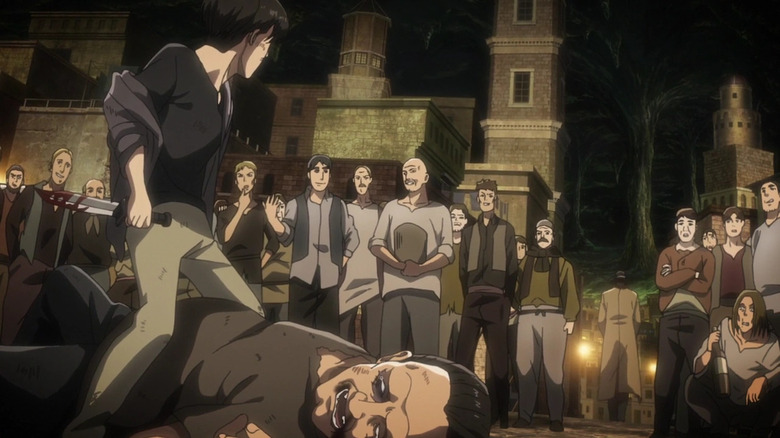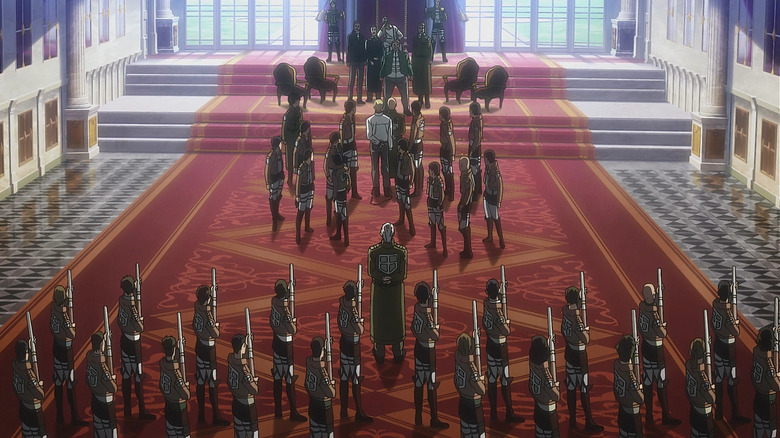Why Fans Of Attack On Titan Need To Watch Silo, The Accidental Live-Action Anime We Deserve
There have been countless live-action anime adaptations, and most of them fail for two reasons: They simultaneously stick too close to the aesthetic of the source material without understanding how to translate animated visuals to live-action, and they also stray too far away from the essence of the story.
But just like how some of the best live-action video game movies don't really adapt any particular game, but are inspired by their aesthetics (think "Scott Pilgrim vs. The World" or "Wreck-It Ralph"), we now have one of the best live-action anime, despite it not adapting any actual anime. The show is AppleTV's sci-fi noir series "Silo," which essentially serves as a live-action version of the first couple of seasons of "Attack on Titan."
At first glance, these shows have nothing to do with each other. "Silo" is a murder mystery at its core that takes place in an underground silo where people think the outside world is destroyed, but they don't know who built the silo, or why. "Attack on Titan" is now an apocalyptic war story about an angry kid wanting to annihilate humankind, but it started as a seemingly post-apocalyptic thriller about the last of humanity living trapped behind massive walls whose origin they don't know, as they hope not to get killed by man-eating titans.
Lived-in worlds
"Silo" calls to mind the early seasons of "Attack on Titan," before we discovered there were humans behind walls and before the concentration camps. Back then, the anime was still very much a mystery show. What are the Titans? Why do they attack humans? Where did the walls come from and why does no one want to find out? These were big questions the show asked early on. The first part of the third season, which put titan fights aside (for a while) to explore conspiracy theories and the oppression of those living behind the walls by those in power, focuses on those questions.
One season focused on the secret military police that assassinated anyone who dared asked questions about the nature of the world, like Erwin's father explaining it's weird how history books state that humanity perished outside the walls as a fact when they cannot be certain of it, or Armin's parents building a hot air balloon to explore the outside world before being shot down by the military police. This made the world of the anime feel vast and alive beyond just the military power fantasy because it felt like a place with intricate cultural rules that keep this society alive.
This is also an area in which "Silo" excels.
We see this not in the first episode, which mostly focuses on the central mystery of what the Silo is, but in the third. That episode of "Silo" is mostly dedicated to a single thing: Rebecca Ferguson's Juliette and her team of mechanics fixing the generator for the entire silo, lest it break down and destroy civilization. The episode works because the audience understands the importance of fixing this thing, we comprehend how the world of the silo works, and we grasp how important seemingly little things actually are to preserving humankind.
It's about the little things
The generator episode is reminiscent of the first season of "Attack on Titan," when the outermost wall being breached by Titans leads to a food crisis due to the loss of crops, and then to a military operation aimed at thinning the population by sending hundreds of thousands to their deaths so the rest wouldn't have to fight for food. It is chilling, it is gruesome, it is understandable. "Silo" doesn't deal in quite the same scale as "Attack on Titan," but it does a great job of showing you the microcosm of larger events.
"Attack on Titan" even has its own underground location (aptly called the Underground), which is one of the coolest parts of the series. It's a whole metropolis, the poorest place within the walls, ridden with crime and unhoused folks. Unsurprisingly, many people are sick as they never see sunlight, and their legs stop working.
"Silo," with its focus on the intricacies of its titular underground society and how a giant vertical structure affects every aspect of daily life, feels like a companion piece to "Attack on Titan," delivering a post-apocalyptic story with similarly meticulous world-building to what the anime juggernaut introduced a decade ago, before it evolved into another type of story altogether.
If you like "Attack on Titan," but miss when things were simpler and we just worried about Titans breaking a wall, or the military police and the king of the walls brainwashing his subjects, "Silo" may just be the show for you. Luckily, the show already got a season 2 renewal, because after that season finale which echoes the last episode of season 3 part 2 of "Attack on Titan," we desperately need answers.


